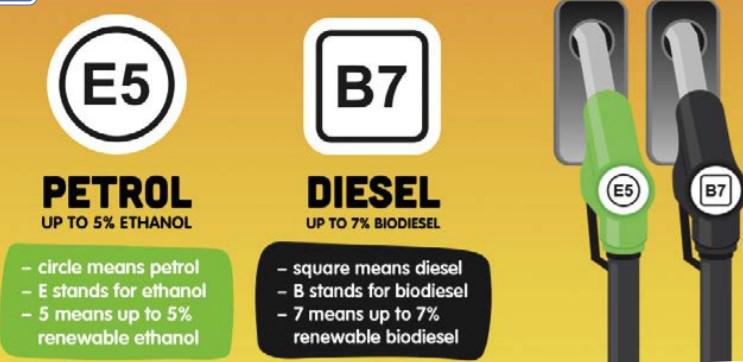
FBHVC NEWSLETTERS
Click here for all FBHVC newsletters on their own website or contact
Emma Balaam
Secretary, Federation of British Historic Vehicle Clubs Ltd.
PO Box 295
Upminster
Essex
RM14 9DG
Tel: 01708 223111
Email:
secretary@fbhvc.co.uk
FUEL SPECIALIST
The FBHVC have appointed
Nigel Elliott - Automotive Fuels Specialist
There is a detailed review of Petrol on the FBHVC website https://fbhvc.co.uk/fuels and provides some clear advice and information in respect of petrol and ethanol covering subjects such as. Introduction of E10, Fuel Volatility, Ethanol, Synthetic Fuels, Other Fuels, Operating Problems and Octane.
NOTES ON NEW FUEL LABELLING NEWSLETTER No.4 SEPTEMBER 2019
Fuel From September 2019 petrol stations will be adding labels showing the level of Ethanol and Biodiesel. Blending biofuels into regular petrol and diesel reduces CO2 emissions, helping us to meet climate change commitments. Petrol, which contains up to 5% renewable ethanol, will be labelled ‘E5’, while diesel, which contains up to 7% biodiesel, will be labelled as ‘B7’ . The important point to note is that the level of Ethanol has not changed, it is just the addition of a label.

A STATEMENT BY THE FBHVC IN THE NEWSLETTER No.5 OCTOBER 2018
Introduction of E10 Fuel
I come
lastly to a matter which is of very great importance to some at least of our
members, and is of long-term significance to us all, as it bears upon the very
ability to use our vehicles in the future. Many members will have been aware
that the Federation was responding to a Department for Transport (DfT)
Consultation on the subject, but a short explanation is probably useful to
explain some of the confusion which we know has arisen.
There has for some time been a
requirement, as a climate change control measure, contained in the EU Renewable
Fuel Transport Obligation (RTFO) scheme. This mandates that given percentages of
transport fuels must come from non fossilfuel sources. While of course continued
compliance with this requirement will be dependent on the outcome of Brexit, it
is unlikely that the attitude of the UK Government to the justification of the
principles of the RTFO will be altering any time soon. Non fossil-fuel sources
means bio-fuels, which in the case of petrol driven vehicles is ethanol. The
feedstocks for these fuels are varied but in the UK are mainly wheat. A
significant industry has built up to support this requirement.
There are defined standards for
petrol with given percentages of ethanol, primarily E5 (no more than 5% ethanol)
and E10 (not more than 10% ethanol). To date no supplier in the UK has offered
E10 at the pumps, though it is quite common across the Channel. The Government
has recently increased the RTFO targets and is now putting pressure on the fuel
supply industry to make E10 fuel available at the pumps at least on larger
forecourts. The vast majority of modern vehicles have been designed to run on
this fuel with no problems. Most of our vehicles, not having been designed to
deal with the properties of ethanol in fuels systems and engines, are adversely
affected by ethanol in petrol, and the adverse effects are greater the higher
the percentage of ethanol the petrol contains. Up till now, no fuel supplier has
offered in the UK a petrol which exceeds a percentage of 5% ethanol, known as
E5.
Quite separately, a number of our
members have vehicles which can only run on petrol with a higher octane rating
than the standard grade (defined as 95RON [Research Octane Number]). This need
has been met by the use of what DfT refers to as the Super grade of petrol (as
we know the description varies brand by brand). These fuels are defined as 97RON
and have actual octane ratings between 97 and 99. These fuels also meet the E5
standard, and indeed some contain less than 5% ethanol. From the introduction of
E5 fuel until the end of 2016 there was a ‘protection grade’ which had to be
supplied, which could not exceed 5% ethanol. But it was also set at 97RON. This
position basically supported all of our members, including those with higher
compression/performance engines.
In its recent Consultation, DfT
makes clear it actively wishes the introduction of E10 fuel on at least the
larger forecourts. DfT does recognise that this will require a re-introduction
of a protection grade. However, it wishes that grade to be set at 95RON and E5.
DfT is making this recommendation primarily to protect the owners of simply
incompatible old vehicles, which it defines as being over 25 years old, which
are generally in use, i.e. not being preserved. It wishes to protect these
owners, who it perceives as being poorer, from having to pay for a high octane
fuel their vehicles do not require.
The DfT is also proposing this
protection grade only lasts for two years, which the Federation believes if too
short to be of any use at all. The view of the Federation is that the
constraints on tankage and petrol pumps will mean that the availability of the
current Super grade may well be lost, which could make some of our members’
vehicles unusable. Therefore, the Federation, while not opposing the
introduction of E10 fuel as such, is arguing strongly for the protection grade
to be, as before, the 97RON E5 grade. We are also arguing that the period for
the protection grade continuation should be five, not two years. I will of
course revert to this issue as it develops.